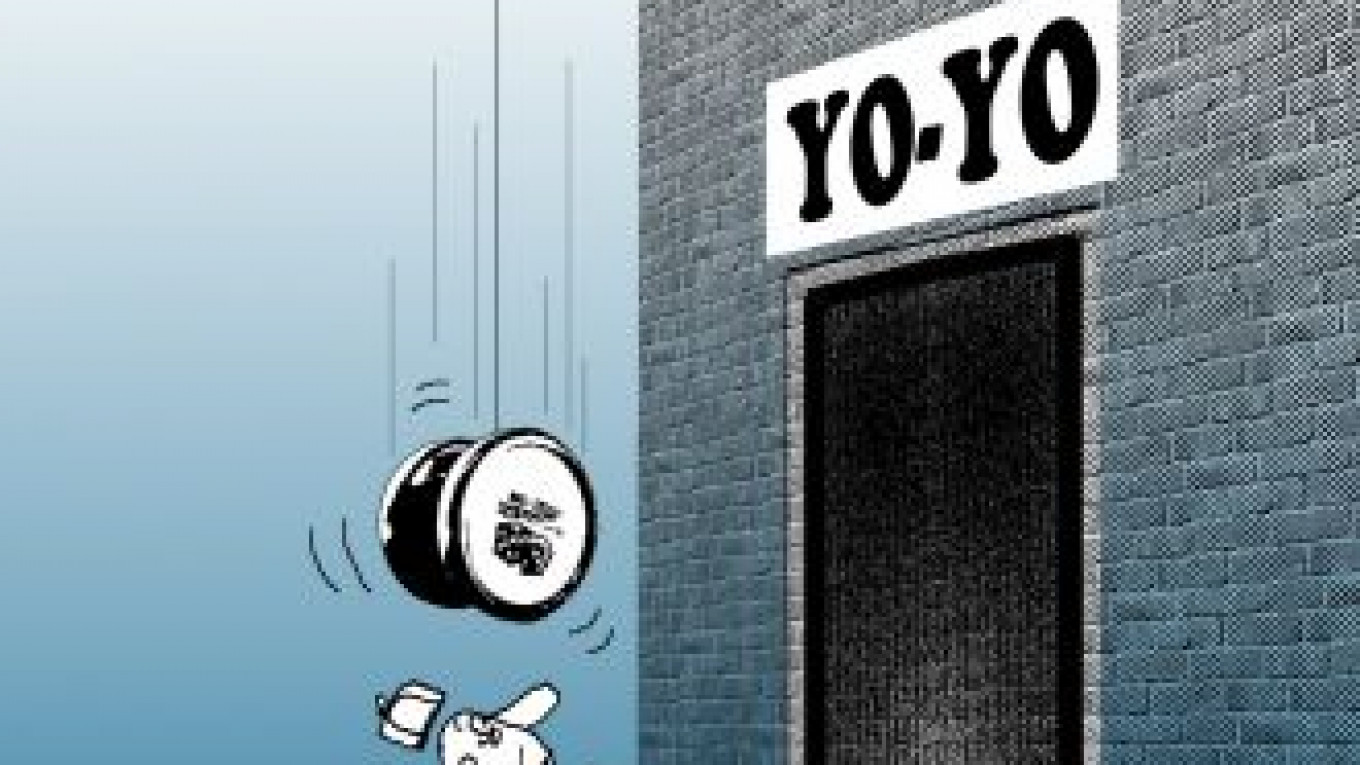There is a small courtyard off Khokhlovsky Pereulok that is still covered in ice but that has metamorphosed over the winter.
I know the spot, as a famous preservationist once stopped a group there, and as he explained the history of a building his young and somewhat bored son picked apart a wall — one hopes not too many centuries old — right opposite.
Just inside the courtyard is a complex of buildings that used to belong to a factory that projects a 19th-century brick facade onto the pereulok. The outer buildings were not so long ago deserted and covered in graffiti. Most of the graffiti is surreal nonsense, although one seems to be an attack on those who protested against the 2005 election in Ukraine — the protestors are holding up dollars to show their venality.
It’s not exactly the Krasny
Oktyabr factory these days, but the buildings around are nonetheless buzzing with small shops run by predominately young people. There is the Rastaman shop where you can stock up on bongs, clocks in the Rastafarian colors, all manners of pipes and an array of hats that would turn Bob Marley Presbyterian. There is the customer-free Yo-Yo shop where yo-yos lay quietly in their boxes, and then there is the shop of small models that are probably used in games that involve power levels.
The main building has the kind of sweeping brass staircases and high ceilings that would have pleased Scarlett O’Hara if she had been the head of a Dom Kultury instead of a spoilt Southern lady. Bits were still crumbling on a last visit, but there were signs of new tenants. Something could be heard from one of the far halls, and as the ominous sound became clearer it was obvious that it was the sound of bongo drums. A sign advertised lessons.
It was an odd Moscow, as if part of a U.S. college town had been transported direct, perhaps from one of those KGB towns they were said to have in the taiga, to Khi-trovka.
There were still some signs of what had been there before the transformation.
In the far corner there is a tourist center called Chip Trip, which when retranslated back means “Cheap Trip.” The area hasn’t lost its old abandoned state, and a sign on the door warns that the tourist bureau does not serve the drunken, those with alcoholic drinks nor those with “pets or wild animals.” The symbol for the agency is the silhouette of a camel, possibly not the one who used to stop at the traffic lights a few streets away.
And there in between Mr. Yo-Yo and his non-bouncing balls and the tattoo and piercing parlor was something that spoke of a truer Moscow: a club where you could learn how to pole dance.
A Message from The Moscow Times:
Dear readers,
We are facing unprecedented challenges. Russia's Prosecutor General's Office has designated The Moscow Times as an "undesirable" organization, criminalizing our work and putting our staff at risk of prosecution. This follows our earlier unjust labeling as a "foreign agent."
These actions are direct attempts to silence independent journalism in Russia. The authorities claim our work "discredits the decisions of the Russian leadership." We see things differently: we strive to provide accurate, unbiased reporting on Russia.
We, the journalists of The Moscow Times, refuse to be silenced. But to continue our work, we need your help.
Your support, no matter how small, makes a world of difference. If you can, please support us monthly starting from just $2. It's quick to set up, and every contribution makes a significant impact.
By supporting The Moscow Times, you're defending open, independent journalism in the face of repression. Thank you for standing with us.
Remind me later.






